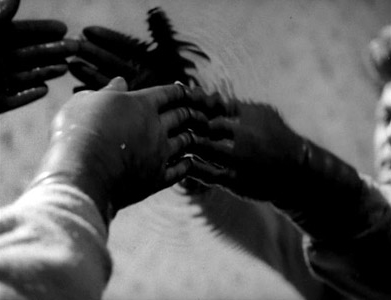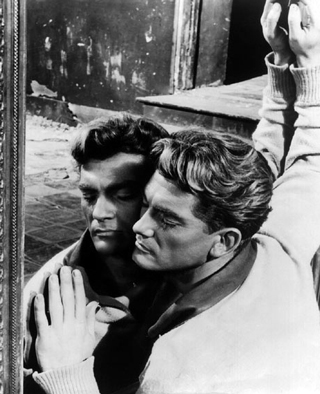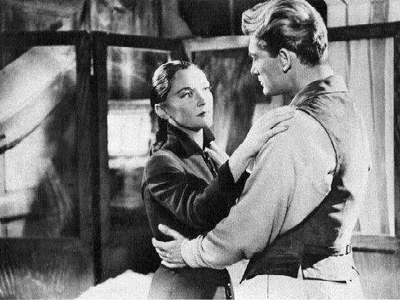
 |
|
|
|
Crowned an artistic genius but also criticized as a publicity magnet, poet Jean Cocteau achieved his most lasting work in the movies. By sublimating his personal themes to "genre", so to speak, he made the definitive fairy-tale movie, Beauty and the Beast. Its success enabled him to take another shot at expressing the metaphysical dilemma of The Artist, as he once attempted in his visually accomplished Blood of a Poet. 1950's Orpheus (Orphée) uses a great many fantastic visuals but is not a surrealist movie, any more than other films blanc that postulate the existence of a world beyond death. The myth of Orpheus and Eurydice has been tweaked to suit Cocteau's autobiographical concerns: he believes that a true poet must mingle with influences 'not of this world' and reckon with the primary puzzle of mortality. 
Cocteau cast his stylized show with actors that occupied important positions in his creative and personal life. Carved-marble Adonis Jean Marais plays Orphée, a wealthy poet-celebrity who has made his mark and is now the target of the envious avant-garde. Orphée witnesses a strange accident that befalls the younger firebrand poet Cégeste (Edouard Dermithe of Les enfants terribles), and is tapped by Cégeste's patron "The Princess" (María Casarès) to help take the young man to the hospital. Cégeste dies in the car and soon thereafter Orphée realizes that he's in the presence of the fantastic: at a lonely country house the sinister Princess re-animates Cégeste and tells him that he is now her servant. Cégeste, The Princess and the somewhat more communicative chauffeur Heurtebise (François Périer of Nights of Cabiria and "Z") all disappear through a mirror as if it were the surface of a pond, but Orphée cannot follow them. Orphée returns home, where he is suspected in Cégeste's disappearance by both the police and a deputation of angry young poets led by a female agitator, Aglaonice (Juliette Gréco of The Roots of Heaven). Apparently between jobs, Heurtebise stays on, helping to calm Orphée's beautiful wife Eurydice (Marie Déa). But the obsessed poet spends his time listening to the mysterious phrases that emanate from the radio of the Princess's car, which is stashed in his garage. Meanwhile, The Princess visits at night, to watch Orphée while he sleeps: she's fallen in love with him. When the same forces of fate claim Eurydice's life, Heurtebise tells Orphée that it is possible to retrieve her from the land of the dead -- if he has enough courage to pass through the mirror. Orpheus is Jean Cocteau's fairy-tale version of his own life, as an artist no longer considered The New Thing, but who remains true to his personal muse. Cocteau's strongest visuals are here. The mirrors are much more than Looking-Glass portals to Wonderland. In Cocteau's narcissistic world one's egotism and the poetic drive are inseparable. Orphée's attempt to pierce the mirror without the magical rubber gloves (is this a sex thing?) leaves him pressed against the glass, seemingly trying to merge with himself. The secret world of the French Underground informs other details, like the messages that come through the limousine's 'special' radio, that Orphée feverishly transcribes in search of their hidden meaning. That's the poet's work in a nutshell. 
Cocteau's screenplay also connects with the postwar purge of French collaborators. This is a personal issue for the poet, for even now it is not difficult to find photos taken during the German Occupation showing Cocteau wining and dining in fancy restaurants with French movie stars and German officers. The Underworld of Orpheus is not Hell, but a strange limbo where moral issues are as slippery as political misdeeds. No identifiable "Death" figure is in charge, only a monotonous hierarchy of dour bureaucrats and operatives like The Princess. The endless trials do not judge newly deceased mortals but are convened to summarily punish 'death agents' that break the rules. Some agents, like the non-verbal motorcycle assassins, behave like faceless soldiers of Fate. But clumsy Cégeste is new to the 'service' and a slow learner. The warm and sympathetic Heurtebise identifies with the living and seems to have formed a spiritual crush on Eurydice. He breaks with the program to repeatedly dispense wise, if difficult-to-follow advice, like "stop trying to understand everything." Although Orphée is not aware of it, María Casarès' Princess is closer to his soul than is his own wife, who remains rooted in bourgeois reality: so much for romance. The Princess defies the stern laws of the universe to eliminate Eurydice and win Orphée for herself. As in a classic myth, the harsh cosmos never entirely vanquishes Love. But unlike a conventional film blanc, a grand sacrifice doesn't guarantee a romantic victory. The film's 'happy' ending seem unfair and more than a little cruel. Orpheus is Cocteau's most successful poetic fantasy. The constant visual tricks of the older Blood of a Poet are pared down and sublimated to a fairly linear story. Cocteau makes simple reverse-filming tricks seem like little miracles, as rubber gloves magically fly onto hands and newly resuscitated corpses rise from the floor to a standing position. Cocteau also inverts the image to negative, sometimes for views rear-projected through car windscreens, and once to show The Princess'es black dress suddenly turning white. The most remarkable sequences take place in what critics would later dub "La Zone", a devastated cityscape of blasted buildings and piles of brick. It's as if the Underworld has decided to reflect the bombings of the war. A few angles show the characters walking in slow motion, passing "lost souls", including a glazier still hawking his wares in a land without windows. Several shots must have been relatively expensive to achieve: the actors crawl along a wall, and after turning a corner, slide down the next wall. The entire set was constructed on its side, with the camera looking down. The two "zone crawlers" look like figures in an ancient frieze or fresco -- the film's strongest visual connection to its source myth. 
Jean Marais embodies the handsome Orphée better than he acts him, but since the character seems only in love with himself and his art, this seems appropriate. Another of Cocteau's lovers Edouard Dermithe is likewise cast well as the clueless Cégeste. Poor Marie Déa draws the thankless role, the only character not in on the cosmic joke, so to speak. Frankly, Orphée doesn't deserve her. Humanizing the enterprise is François Périer as Heurtebise, the chauffeur-secret agent who chooses to hang around the house with Eurydice. And the film's real magic is enclosed in the dark and mysterious eyes of the amazing María Casarès, who could be a tragic victim (The Children of Paradise) or a menacing viper (Les dames du Bois de Boulogne). The Princess must be a true enigma, a figure both sinister and capable of depthless love. Casarès's Princess suggests even more than that. Her love gives her the strength to endure eternal darkness, it seems. Criterion's Blu-ray of Orpheus gives Jean Cocteau's autobiographical, mythological fantasy a high polish, with a sharp B&W transfer and a clear soundtrack for Georges Auric's moody music score and jazz cues. One sequence follows Orphée around Paris, where a half-dozen scattered sites seem just around the corner from each other. But the scenes we remember most are the underworld with its perpetual night and magical mirrors. Disc producer Susan Artosteguy's special edition features begin with a commentary by James S. Williams. The selection of film featurettes throws a wide net, starting with a feature-length 1984 docu on Cocteau and newsreel footage of the ruined military school used in the "Zone" sequence. La villa Santo-Sospir is a 35-minute Kodachrome amateur film by Cocteau from 1950, documenting the designs he painted seemingly in every room of a beautiful house belonging to a rich sponsor. Edouard Dermithe is in the show, along with a selection of his paintings. (Cocteau later adopted Dermithe, who subsequently married a woman and had children.) Interview pieces include a 1956 interview with the director about the film's music and another called 40 Minutes with Jean Cocteau. A 2008 interview with Cocteau's assistant director answers questions about the many special camera effects in his films, and a gallery of images and an original trailer finish the film package. The insert booklet contains an essay by Mark Polizzotti, Cocteau's responses to questions about his film, and an essay on La villa de Santo-Sospir by commentator Williams.
On a scale of Excellent, Good, Fair, and Poor,
Orpheus Blu-ray rates:
Reviews on the Savant main site have additional credits information and are often updated and annotated with reader input and graphics. Also, don't forget the 2011 Savant Wish List. T'was Ever Thus.
Review Staff | About DVD Talk | Newsletter Subscribe | Join DVD Talk Forum |
| ||||||||||||||||||